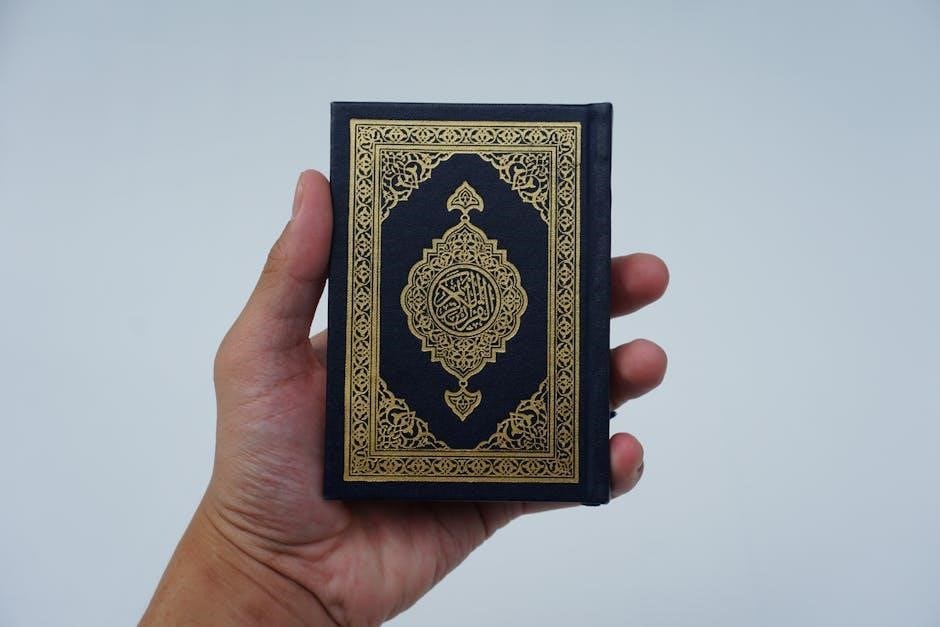Julie Otsuka’s novel, When the Emperor Was Divine, explores the poignant story of a Japanese American family during WWII, their internment, and the emotional aftermath. Available in PDF format, this powerful historical fiction captures the resilience and struggles of a family torn apart by war and injustice, offering a deeply moving portrayal of a shameful chapter in American history.
Overview of the Book
When the Emperor Was Divine, written by Julie Otsuka, is a powerful historical fiction novel that explores the experiences of a Japanese American family during World War II. Set in 1942 Berkeley, California, the story follows the family’s abrupt uprooting after the U.S. government issues an evacuation order. The novel captures their journey from their home to an internment camp in Utah, detailing the harsh conditions and emotional struggles they face. Through concise and evocative prose, Otsuka examines themes of identity, injustice, and resilience. The book is available in PDF format, making it accessible to readers worldwide. This poignant narrative offers a deeply human perspective on a tragic chapter of American history, resonating with readers through its emotional depth and historical significance.
Historical Context of Japanese Internment

The Japanese internment during World War II was a result of Executive Order 9066, signed by President Franklin D. Roosevelt in 1942. This order authorized the forced relocation of approximately 120,000 Japanese Americans, most of whom were U.S. citizens, into internment camps. The decision was driven by wartime hysteria, racial prejudice, and fear of espionage, despite a lack of evidence supporting such claims. Families were given short notice to pack their belongings and were confined in harsh conditions, often in remote desert areas. This period marked a grave injustice, causing significant loss of property, livelihoods, and cultural identity. The internment lasted until 1945, leaving lasting emotional and societal scars on Japanese American communities. This historical backdrop is central to the narrative of When the Emperor Was Divine, highlighting the resilience and struggles of those affected.

The Historical Background
Set during WWII, Julie Otsuka’s novel portrays the forced relocation of Japanese Americans, exploring themes of identity and injustice, available in PDF format for readers.
Japanese American Internment During WWII
During World War II, over 120,000 Japanese Americans were forcibly relocated to internment camps under Executive Order 9066. This mass incarceration, justified by fear and racism, uprooted families from their homes, separating them from their livelihoods and communities. The novel When the Emperor Was Divine vividly portrays this era, capturing the emotional and psychological toll on those detained. Families endured harsh conditions in remote camps, facing loss of identity, property, and dignity. The internment camps became symbols of injustice, reflecting the broader societal prejudice against Japanese Americans during wartime. The novel, available in PDF format, offers a poignant exploration of this dark chapter in American history, highlighting the resilience and struggles of those affected.
The Impact of Executive Order 9066
Executive Order 9066, signed by President Franklin D. Roosevelt in 1942, authorized the forced relocation of Japanese Americans to internment camps. This order, justified by wartime fear and racism, led to the uprooting of over 120,000 individuals, including citizens and non-citizens alike. Families were given minimal notice to pack their belongings, leaving behind homes, businesses, and livelihoods. The order not only caused immediate economic and emotional devastation but also erased the sense of belonging and identity for Japanese Americans. When the Emperor Was Divine captures the profound impact of this order, detailing the loss of freedom, dignity, and security. The novel, available in PDF format, serves as a powerful reminder of the consequences of fear-driven policies and their lasting effects on communities.

The Plot Structure
The novel is divided into five sections, each capturing the family’s journey from Berkeley to internment and back, told through multiple perspectives, highlighting their emotional struggles, available in PDF.
The Family’s Uprooting from Berkeley
The novel begins with a Japanese American family in Berkeley, California, receiving a notice ordering their relocation. The family swiftly packs their belongings, facing the harsh reality of being classified as enemy aliens. The mother, practical and resilient, leads the family through this upheaval, while the children struggle to comprehend the sudden loss of their home and normalcy. The father, absent due to his arrest, leaves a void that intensifies the family’s sense of dislocation. This section captures the emotional turmoil and confusion as they prepare to leave behind their familiar life, embarking on a journey to an uncertain future in an internment camp. The family’s uprooting from Berkeley marks the beginning of their traumatic experience, available in PDF format.
Life in the Internment Camp
Life in the internment camp is depicted as harsh and dehumanizing, with the family enduring cramped, unsanitary conditions in a remote Utah desert. The mother struggles to maintain a sense of normalcy, while the children grapple with feelings of alienation and confusion. The camp’s barren environment and rigid rules amplify the family’s emotional distress. The father’s absence looms large, adding to the sense of fragmentation. Otsuka vividly captures the daily struggles, from meager rations to the loss of privacy, highlighting the psychological toll of confinement. The camp becomes a symbol of displacement, where cultural identity and family bonds are tested. The novel, available in PDF format, poignantly portrays the resilience and quiet strength of the family amidst overwhelming adversity.
The Family’s Return Home
The family’s return home after their internment is marked by a mix of relief and disillusionment. Their once-familiar house in Berkeley feels foreign, stripped of personal belongings and memories. The mother struggles to rebuild a sense of normalcy, while the children face awkward interactions with former neighbors, who now regard them with suspicion or indifference. The father’s absence remains a gaping wound, and the family’s silence about their experiences reflects the broader societal avoidance of the internment’s legacy. The novel, available in PDF format, poignantly captures the emotional toll of displacement and the difficulty of reclaiming a life interrupted by war and injustice.
The Father’s Fate and Legacy
The father’s fate remains shrouded in mystery, as his arrest and internment separate him from the family early in the novel. His absence becomes a silent, enduring ache, leaving the family to grapple with unanswered questions. The mother and children rarely speak of him, their silence reflecting the pain and shame associated with his disappearance. The father’s legacy is intertwined with the broader narrative of Japanese American internment, symbolizing the countless lives disrupted by wartime policies. His story, like many others, becomes a testament to resilience and the unspoken traumas of a generation. The novel, available in PDF format, underscores the lasting impact of his absence on the family’s identity and healing process.

Characters and Perspectives
The novel focuses on a Japanese American family, exploring the mother’s resilience, the children’s alienation, and the father’s absence. Perspectives shift, offering intimate insights into each character’s emotional journey, while the third-person limited viewpoint enhances the narrative’s depth and connection to their experiences. The PDF version captures these dynamics vividly, making the story accessible and poignant for readers.
The Mother’s Struggle and Resilience
The mother in When the Emperor Was Divine embodies resilience as she navigates the family’s uprooting and internment. Her quiet strength is evident as she packs belongings, adapts to camp life, and shields her children from harsh realities. Despite the emotional toll, she maintains dignity, ensuring her family’s survival. The PDF version highlights her internal struggles, revealing grief, shame, and determination. Her resilience is a testament to the enduring spirit of Japanese American women during WWII, making her a powerful symbol of hope and survival in the face of injustice.
The Children’s Experience of Alienation
In When the Emperor Was Divine, the children’s experience of alienation is profound, as they grapple with the loss of their home, identity, and sense of belonging. The eldest child, in particular, feels disconnected from both Japanese and American cultures, while the younger sibling struggles with abandonment and confusion. The PDF version vividly captures their emotional isolation, as they navigate the harsh realities of the internment camp and the absence of their father. Their alienation is compounded by the racial discrimination they face, leaving lasting scars on their psyche. Otsuka’s portrayal highlights the devastating impact of war on children’s innocence and their struggle to find their place in a fractured world.
The Father’s Absence and Its Impact
The father’s absence in When the Emperor Was Divine leaves a profound void in the family, exacerbating their emotional turmoil. His disappearance, linked to his detention as a suspected enemy alien, creates a sense of abandonment and uncertainty. The PDF version of the novel highlights how his absence disrupts the family’s dynamics, leaving the mother to bear the burden of caregiving alone. The children, particularly, struggle with the loss of paternal guidance, leading to feelings of confusion and insecurity. The father’s fate serves as a poignant reminder of the broader injustices faced by Japanese Americans during WWII, leaving a lasting impact on the family’s identity and unity. His absence becomes a symbol of the fragility of family bonds under oppressive circumstances.

Themes and Symbolism
The novel explores themes of identity, belonging, and injustice, with the Emperor symbolizing a distant authority, contrasting the family’s harsh reality in the internment camp.

Identity and Belonging
In When the Emperor Was Divine, Julie Otsuka delves into the struggle of Japanese Americans to reconcile their dual identities during WWII. The novel portrays the tension between cultural heritage and the pressure to assimilate into American society. The family’s internment underscores their alienation, as they are forcibly separated from their home and community. The mother’s efforts to maintain a sense of normalcy highlight the fragility of belonging in a hostile environment. The children’s experiences further illustrate the generational divide, as they grapple with feelings of displacement and confusion about their place in the world. The novel poignantly captures the loss of identity and the enduring quest for a sense of belonging in the face of systemic injustice and cultural erasure.

Injustice and Racial Discrimination
Julie Otsuka’s When the Emperor Was Divine vividly portrays the systemic injustice and racial discrimination faced by Japanese Americans during WWII. The novel highlights how Executive Order 9066 led to the forced internment of over 120,000 individuals, labeling them as “enemy aliens” without due process. The family’s abrupt uprooting from Berkeley and their confinement in a Utah desert camp illustrate the harsh realities of racial profiling and xenophobia. The father’s arrest and separation from his family underscore the arbitrary nature of the government’s actions; Otsuka’s narrative captures the emotional toll of being stripped of citizenship rights and the enduring scars of racial discrimination, offering a powerful critique of a dark chapter in American history.
Memory and Trauma
Julie Otsuka’s When the Emperor Was Divine delves into the profound impact of memory and trauma on a Japanese American family during WWII. The novel captures the emotional scars left by forced internment, as the family grapples with loss and displacement. The mother’s silence and the children’s alienation reflect the psychological toll of their experiences. The train ride to the camp and the mother’s reaction upon returning home are poignant reminders of the trauma endured. Otsuka’s concise prose underscores how memories of the past linger, shaping the family’s identity and sense of belonging. The novel vividly portrays how historical events leave lasting emotional wounds, resonating deeply with readers.
The Symbolism of the Emperor
The title When the Emperor Was Divine symbolizes the divine authority of the Japanese Emperor, contrasting with the family’s experience of displacement and loss. The emperor, a distant figure, represents a connection to heritage and identity, yet his absence in their lives underscores the family’s alienation. The novel uses the emperor as a metaphor for the fragmented relationship between the Japanese American community and their cultural roots. The title reflects the family’s lost sense of belonging and the disruption of their lives due to internment. It also highlights the tension between the divine ideals of sovereignty and the harsh realities of racial discrimination and injustice faced by Japanese Americans during WWII.

Literary Style and Narrative
Julie Otsuka’s When the Emperor Was Divine employs a third-person limited perspective, shifting between characters to evoke their inner worlds. Her concise, powerful prose captures the family’s emotional journey with precision and depth, creating a haunting yet intimate narrative that explores themes of identity, loss, and resilience. The novel’s structure, divided into five distinct yet interconnected sections, mirrors the fragmented nature of the family’s experience during internment, offering a poignant reflection on memory and trauma.
Third-Person Limited Point of View
Julie Otsuka’s When the Emperor Was Divine is narrated through a third-person limited perspective, which shifts between characters to reveal their inner thoughts and emotions. This narrative technique allows readers to deeply connect with each family member’s experiences, creating a sense of intimacy and immediacy. The limited viewpoint also heightens the emotional impact by focusing on individual struggles while maintaining a broader perspective on the collective trauma. As the story progresses, the shifting focus mirrors the fragmentation of the family’s life, offering a poignant exploration of identity, loss, and resilience. This narrative style effectively captures the psychological toll of internment, making the characters’ journeys feel both personal and universal.
Concise and Powerful Prose
Julie Otsuka’s When the Emperor Was Divine is renowned for its concise yet deeply evocative prose. The novel’s sparse, elegant language captures the emotional weight of the family’s experience without unnecessary embellishment. Otsuka’s writing is both precise and powerful, conveying the complexity of her characters’ inner lives through subtle details and nuanced observations. The brevity of her sentences often contrasts with the depth of the themes she explores, such as loss, identity, and resilience. This stylistic choice underscores the quiet dignity and strength of the characters, making their story both haunting and unforgettable. The prose’s clarity and restraint allow readers to fully immerse themselves in the narrative, amplifying the emotional impact of the family’s journey.
Reception and Impact
When the Emperor Was Divine received widespread critical acclaim for its poignant portrayal of Japanese American experiences during WWII. The novel sparked controversy in some educational settings due to its sensitive themes but remains a significant work in historical fiction. Its availability in PDF format has broadened its reach, ensuring its powerful story continues to resonate with readers.
Critical Acclaim and Reviews
Julie Otsuka’s When the Emperor Was Divine has garnered widespread critical acclaim for its powerful and poignant portrayal of a Japanese American family’s experience during WWII. Reviewers have praised the novel’s concise yet evocative prose, which captures the emotional depth of the characters’ struggles. The book has been described as a “masterpiece of simplicity” and a “hauntingly beautiful” exploration of identity, injustice, and resilience. Many critics have highlighted its ability to evoke a sense of intimacy and universality, making it a significant contribution to historical fiction. The novel’s availability in PDF format has further expanded its reach, allowing readers worldwide to engage with this compelling narrative.
Controversy in Educational Settings
Julie Otsuka’s When the Emperor Was Divine has faced controversy in some educational settings due to its depiction of sensitive historical events. In Muskego, Wisconsin, the novel was removed from a high school curriculum after some parents objected to its content, citing concerns about its portrayal of Japanese internment camps. However, advocates argue that the book provides a vital perspective on a lesser-known chapter of American history. Despite the backlash, the novel remains a significant educational resource, with its PDF availability making it accessible for classroom use. The controversy highlights the importance of diverse voices in education and the challenges of addressing painful historical truths.
Availability in PDF Format
Cultural and Historical Significance
When the Emperor Was Divine holds profound cultural and historical significance, shedding light on the Japanese American experience during WWII and fostering discussions about injustice and resilience.
Portrayal of Japanese American Experience
Julie Otsuka’s When the Emperor Was Divine offers a poignant portrayal of the Japanese American experience during WWII, capturing the trauma and resilience of a family uprooted from their Berkeley home. The novel vividly depicts their journey to an internment camp in Utah, the harsh conditions they endured, and the emotional toll of displacement; Through their story, Otsuka highlights the broader struggles of Japanese Americans, including the loss of identity, the fracture of family bonds, and the enduring impact of racial injustice. The book, available in PDF format, provides a powerful lens through which to understand this often-overlooked chapter of American history, evoking both sadness and a deep appreciation for the strength of the human spirit.
Contribution to Historical Fiction Genre
Julie Otsuka’s When the Emperor Was Divine significantly contributes to the historical fiction genre by offering a unique and intimate portrayal of the Japanese American experience during WWII. The novel’s concise yet powerful prose, combined with its emotional depth, sets it apart in the genre. Otsuka’s ability to weave historical facts with fictional narratives creates a compelling and educational read. The book’s availability in PDF format has further expanded its reach, making it accessible to a broader audience. By focusing on the personal and collective struggles of a Japanese American family, Otsuka sheds light on a lesser-known chapter of history, enriching the historical fiction genre with a story of resilience, identity, and injustice.

Julie Otsuka’s When the Emperor Was Divine is a poignant and powerful exploration of identity, injustice, and resilience. The novel captures the emotional journey of a Japanese American family during WWII, shedding light on a dark chapter of history. Through its concise and evocative prose, Otsuka conveys the profound impact of internment on individuals and families. The book’s availability in PDF format has made it accessible to a wide audience, ensuring its important story reaches readers worldwide. Ultimately, the novel serves as a reminder of the past while resonating with contemporary themes of belonging and justice, solidifying its place as a significant work in historical fiction.
